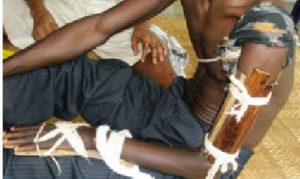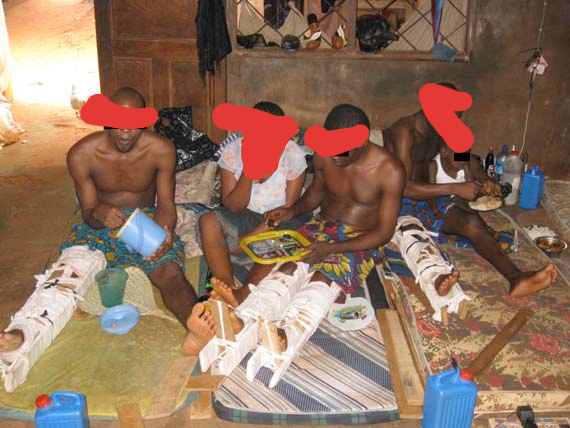Says 99.9% of cases of amputations at Igbobi came from them
‘Most of the pryrrhic successes they’ve claimed didn’t affect bones’
Nigerians have been advised to avoid patronising traditional bone setters, saying many cases of limb amputations recorded at Orthopaedic hospitals have been damaged at the local centres, where relatives first sought for solutions.
This was the view of Dr. Mufseer Owoola, a consultant orthopaedic surgeon at the National Orthopaedic Hospital, Igbobi, who spoke on coping with arthritis at the medical outreach of The Muslim Congress (TMC), Mushin, Lagos.
Dr Owoola said, “there are so many doctors especially among the traditional bone setters who don’t really have the knowledge about bones, arthritis or things that have to do with orthopaedics. Ultimately, the so-called traditional doctors usually do not have an idea of what is wrong with the bones and in the end, the patients end up at Igbobi and having to pay five times or ten times what they would ordinarily have paid if they had come in earlier.
When asked why he discourages patronising traditional bone setters, Dr Owoola said it is because they lack basic knowledge, skills and requirements to handle orthopaedic cases.
“I said so because many of them didn’t go to Orthopedic schools (and didn’t study the handling of orthopaedic cases). When you go there, they do not even carry out x-rays to know exactly what the problem is. They don’t conduct any tests as well. All they do is tie bamboo sticks and bandage around your hand(s) or your leg(s). This is what you see in a lot of people who end up in Igbobi with terrible problems. By the time they come to us, some of them come with stiffness of joints which becomes very difficult to treat.
“Some of them even come with what we call gangrene – meaning the death of the limbs. And, when that limb is dead, there is nothing we can do. We can rather save the life of that patient by removing the dead hand or leaving the person to die with the hand.
“Of course, you and I know what choices we have to make. We save the life by amputating the dead hand. That is the solution at that moment. If you don’t take off the dead hand, the person is going to die at the end of the day because the germs and terrible toxins inside the dead limb would enter the entire body and then the body becomes diseased which can lead to death.”
Some Nigerians kick….
Some Nigerians with bone challenges told Muslim News that they patronised the traditional bone setters due to the rate of successes the practitioners have recorded over the years.
Kingsley Emmanuel said, “With traditional bone setters, healing is certain and no one is going to cut-off your leg unlike Orthopaedic hospitals that are known as amputation centres.”
Dr Owoola debunked the claims, noting, they have not recorded successes, adding that orthopedic hospitals are not amputation centres.
He said, “I don’t think they have recorded a lot of successes. Yes, they haven’t. It is probably because the bone in the first instance did not break. When you have an injury, 3 things can happen, you can either have what we call soft tissue injury – that is injury to your muscle, and of course there will be swelling. Also, you can have your bone broken and lastly, there is dislocation.”
Speaking further, Dr Owoola said, “Most of those successes they claim to have achieved are soft tissue injuries only. In this case, the bone did not break, there’s neither fracture nor dislocation. They won’t even do x- rays to really tell you whether or not your bone is broken or your joints are dislocated.
“Once patients go to their centres, what they do is just tie bamboo sticks and bandage and after some days, if it is soft tissue injury or muscle injury, the pain will go away and the man will, say ‘ah! I went to that baba and I’m cured’.

“This isn’t the case. I wish that you come to Igbobi one of these days and see the number of cases of spoilt hands and legs. So, it’s so common that there’s no day you will not see three to five patients coming to Igbobi, who have gone to these people before coming here.”
Orthopedic hospitals are not amputation centres
He said, “Orthopaedic hospitals are not amputation centres. They have done a lot of successful surgeries in orthopaedic centres. The limbs they have to amputate are the ones that have gone to the traditional bone setters. 99.9% of those cases that come to Igbobi in Lagos end up with amputation of the hand or the leg.
“They are people who have gone to traditional bone setters and have had their hands and legs spoilt, because at that point in time we were battling between saving the life of that patient by cutting off the hand or letting him die with the hand.
“Mind you, when they come, they have to sign consent before we can even take off the hand. If they refuse to sign the consent, we cannot do anything. Secondly, you have to pay for it because it is a surgical operation. If you don’t pay we won’t do it. So, everybody has a choice. If you come in, nobody will grab you and take off your hand. It is those that are really at the point of death, that we take off their hands.
Arthritis affects people of all ages
The Consultant said people of all ages will at one point in their life have arthritis, noting “when the time comes, they should not keep quiet or treat themselves. All they need is a competent specialist in orthopaedic and trauma surgery (unit) so that they can get a better outcome for whatever disease they have.”
According to him, “There are so many types of arthritis. We have Osteo arthritis which is age related. At any point in time, all of us will have some form of arthritis or the other. Anybody above the age of 40, 50 or 60 will definitely have it. Someone’s joint or other part of the body will become arthritic and there will be pain. It will also have some inflammation.
“The age at which it comes depends on the activities you have used that joint to do. If you are the type that was very active when you are young or you had a lot of walking around, jumping from one place to the other, you are likely to have arthritis earlier. If you are the type that had an accident to any part of your bones close to a joint before then, arthritis is likely to come earlier than somebody who didn’t do all that.
“For example, people who engage in sports. The footballers will retire by 35 or 40 because their joints have gone through a lot of training and stress activities. Their joints will wear out faster than somebody who doesn’t play football. At some point, everybody will have it.
When the time comes, Dr Owoola urged Nigerians to visit specialists, saying, “that is the solution to it. You have to take care of it by seeing a specialist who will carry out x-rays and some other investigations like CT scan or MRI to know the type of arthritis you have and to know exactly how you can manage it, so that you can live a pain free life.”



